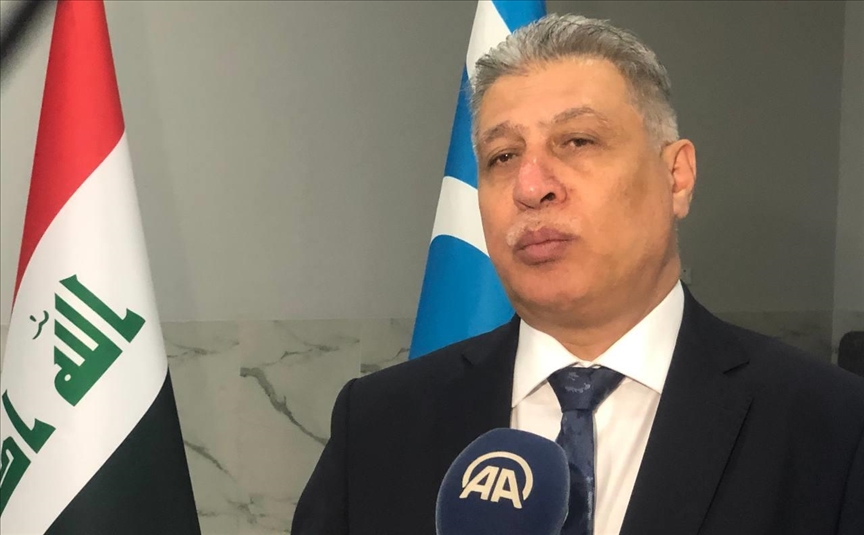Iraq's new electoral system leaves Turkmen at risk of political discrimination: Party chief
New election system in Iraq stirs tensions as Turkmens remain marginalized, says Iraqi Turkmen Front party

ISTANBUL
The latest changes in Iraq's election law have caused tension in the country, especially among Iraqi Turkmens, who are losing seats in the Kirkuk region in early general elections held in October 2021.
Turkmens demanded that the changes be reviewed, citing the country's demographic structure as the cause behind their losing seats in Turkmen areas in the elections.
The leader of the Iraqi Turkmen Front (ITF), Arshad Salihi, said the new narrowed electoral zone system, dividing Kirkuk into three electoral districts, had affected the Iraqi Turkmens' political representation.
"While Kurds and Arabs were able to secure their votes in their densely populated areas, Turkmens had to compete for them," he added.
Salihi emphasized that the people of Kirkuk could not be represented correctly in the Iraqi parliament under the new system.
"The Arabization and Kurdification policies implemented in Turkmen villages resulted in Kirkuk Turkmens losing their seats in the last election," he added.
Iraqi Turkmens punished constantly
Turkmens have constantly been punished in Iraq, seen as an "extension" of neighboring Türkiye, according to Salihi, who added they were ignored for seats in Iraqi governments, parliaments, and ministries.
"We have struggled to be represented and take charge in government," he said.
Salihi pointed out that after the coalition government formed in 2022 was dissolved, the newly formed administration held talks with Kurdish representatives, as well as Shiite and Sunni Arabs, but not with Turkmen representatives.
"They found it more beneficial for Turkmens not to take part in the new government," he asserted.
"Both the Shia and Sunnis in the government negotiated with the Kurdish representatives over Kirkuk. They didn't want to the deal break or the bargaining to be harmed by including the Turkmens. The Iraqi authorities still see us as an extension of Türkiye."
Turkmens seek Turkic world's help
Salihi emphasized that Turkmens should reconsider their attitude towards the central government should it continue its policy of changing the demographic structure of Turkmen areas of Kirkuk and other parts of Iraq.
The ITF leader pointed out that the Turkic ethnic group has always "defended the territorial integrity of Iraq. However, they have always been exposed to more political discrimination."
"We were constantly excluded from the Council of Ministers and the parliament," he added.
Salihi said it was a serious danger that the PKK terrorist organization and its extensions resided in places where Turkmens live.
"Housing terrorist organizations in our region may endanger Kirkuk and its future," he said.
"As Iraqi Turkmens, we struggle to maintain peace and security in our region, the reason that pushed us to request support from Türkiye and other Turkic states, which has displeased the Iraqi government," he added.
He concluded that if Iraqi authorities continue their "discriminatory policy" against Turkmens, they would continue "knocking on outside doors."
Three separate electoral districts in Kirkuk
Iraq's election law 2020/9, enacted for the elections held on Oct. 10, 2021, was the first such provision in the country based on the narrowed electoral district system.
Turkmen parties expressed their concern over the division of Kirkuk, which is home to a large Turkmen population, into three separate electoral districts.
This division of the region, which is represented by 12 parliament seats in total, into three separate electoral districts, could lead to a great loss of Turkmen votes in the elections, Turkmens have said.
The first electoral constituency that Kirkuk was divided into consists mainly of Kurdish voters and has five seats. The second includes both Kurdish and Arab voters but is mainly home to Turkmen voters and has four seats, while three seats were given to the third constituency, where Arab voters dominate.
While Kurds secured seats in the north of Kirkuk and Arabs in the south, Turkmens had to compete for the 4 seats reserved for the city center in the second region, where they only acquired two seats due to the new system.
*Ikram Imane Kouachi in Ankara contributed to this report
Anadolu Agency website contains only a portion of the news stories offered to subscribers in the AA News Broadcasting System (HAS), and in summarized form. Please contact us for subscription options.







